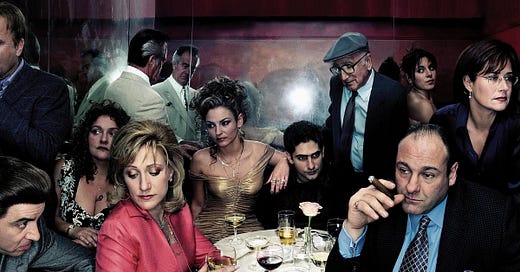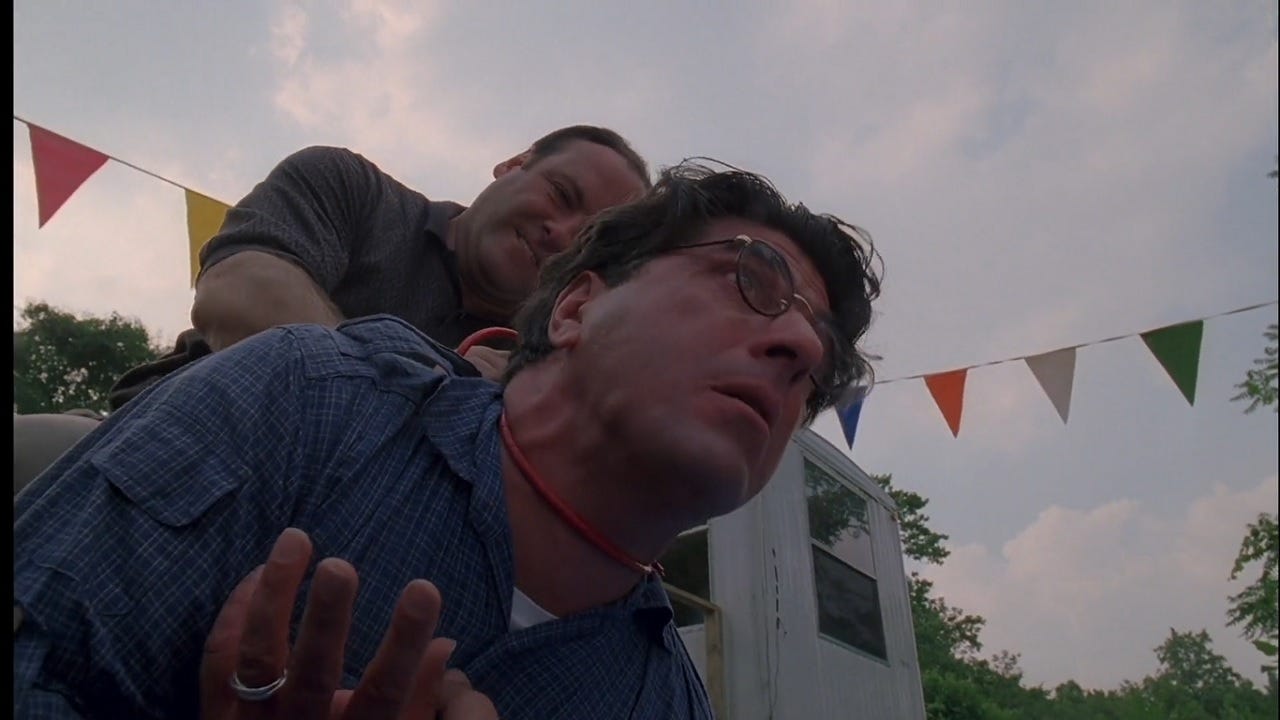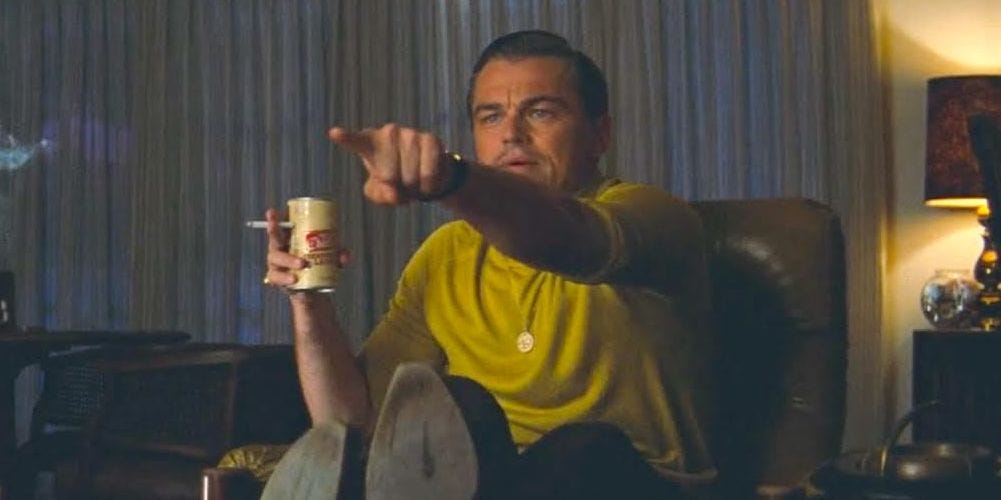If you’re going to discuss pop culture or television in the 21st century, you are pretty much obligated to touch on The Sopranos at some point1. It’s easy to forget how different the landscape of TV and entertainment was back in 1999 when the show debuted2. While not the first show produced on cable and not the first to take an innovative look at organized crime, it’s widely considered to mark the beginning of the “prestige TV” era3. Suddenly it was okay to take TV shows seriously as art instead of regarding them as easy trash, and there was a renewed focus on over-arching story arcs as opposed to self-contained episodes that left the universe more or less unchanged when they were done.
It’s safe to say the influence of The Sopranos is pretty huge, even if the show hasn’t aged too well in some ways4. I started re-watching the show recently; I hadn’t watched it since it ended <checks notes> in fucking 2007 are you kidding me? Sweet lord I am closer to death than I think5.
Ahem.
So, I started re-watching The Sopranos and there’s some seriously clunky writing in that first season, and there’s some trouble with the calibration between humor and violence. In fact, over the course of the first four episodes you couldn’t be blamed for thinking the show was a comedy more than a drama. Much of it is played pretty broad, and there’s a lot of effort put into making Tony Soprano (James Gandolfini) charming. They play up the contrast between what Tony does for a living and how he lives—i.e., a typical, vanilla suburban life in New Jersey6.7
Which is why, in the entire run of the show, the fifth episode of the first season (“College”) is the most important. Because it establishes that Tony is a monster just when you’re starting to like the guy. If that episode had been delayed or removed, the whole series would have been much less successful.
Jimmy Says Hello from Hell You Fuck
The first four episodes of The Sopranos exist as a kind of Schrodinger's Show8. The tone is, frankly, all over the place. It’s frequently humorous, and puts a lot of effort into making Tony Soprano not just palatable but likable. This was necessary, of course—you’re asking people to invest significant time into hanging out with this character. We don’t have to think he’s a good person, but we have to enjoy spending that time9.
Thankfully, James Gandolfini was an incredibly charming screen presence, so liking Tony was never a problem. But when you’re working to make an antihero like Tony likable you have to be careful. You need to calibrate. If you make them too likable, they’re not a danger any more and there goes your tension. In a show like The Sopranos, which balanced humor and violence, losing that edge would transform it into a soggy, undercooked sitcom.
So episode 5, “College,” was a necessary—crucial—correction.
The episode centers on Tony taking his daughter Meadow to visit some New England colleges10. Tony’s concerned that his kids have figured out he’s in the mafia, but he soon has another concern: He thinks he recognizes a man as a former associate who turned rat. If he’s right, Tony knows he’s honor-bound to kill him.
The rest of the episode is a loose game of cat and mouse. Tony has his nephew and mob associate Christopher do some investigating, and Tony himself collects clues until he’s certain he had his man. The target knows who Tony is, and takes steps to defend himself, eventually getting the drop on Tony. Just as he’s about to shoot, he sees Tony interacting with his 17-year old daughter and he hesitates. He can’t kill a man who’s taking his daughter around to colleges.
Later, Tony finds him—and Tony has no such hesitation. He strangles the man to death even after he’s informed of the man’s recent mercy11. It’s a brutal scene. Two decades of “prestige” television later the scene might not seem so shocking, but at the time it was a surprise, especially in light of the tone of the show up to that point.
But it was necessary. It firmly established the fact that Tony is a monster. He’s an irredeemable, violent criminal. He’s a sociopath, a man who can be very charming and all smiles one minute and strangling someone to death the next. Cut this episode and The Sopranos is a very different show, and probably a less successful one. Because if you cut this episode, Tony remains a goofball instead of a legitimate threat12. This was the episode that demonstrated Tony Soprano wasn’t just a grumpy, impish mob-type, but rather a grumpy, impish coldblooded murderer.
It’s In the Way That You Use It
This necessary corrective to Tony’s character arrives in the midst of an episode that otherwise maximizes Tony’s image as a cuddly diamond in the rough. He’s driving his daughter to colleges, they’re bonding in the car, he’s exhibiting some hints of discomfort with the life he’s chosen now that his kids are aware of it. He’s a charming, slightly embarrassing Dad when Meadow meets some older girls who are already enrolled in the school, he’s a gruff, irritated boss when Christopher complains about his work. It is, in other words, the ideal setting to rip off the bandage to reveal Tony’s true nature, because it overbalances his character. It pushes him deep into comical territory. This not only makes the murder that much more shocking, but it takes all the light-hearted energy built up during the episode and alchemically converts it into something dark and dangerous. The effect is electrifying.
And, of course, it makes it clear that we should not under any circumstances like Tony Soprano. Or trust him not to excuse himself from whatever social event he’s at to murder one of your neighbors, or perhaps your dog.
Once this episode was in the can, the show was free to dive as deeply into Tony’s cuddly side as it wanted or needed to. The danger of Bowdlerizing Tony had been removed, because from this point forward any time you were tempted to think aw, this Tony Soprano is such a sweetheart you would immediately be reminded of this
Next week: Bored as hell in the Gilded Age
Unless you’re one of those people who likes to work the fact that you don’t own a television into every single conversation. Congratulations! You suck.
Let’s blow some minds: The overall #1 show on TV in 1999 was Who Wants to be a Millionaire?, the #1 drama was ER, and the #1 comedy was Friends. That might as well be the 17th century.
Let’s remind ourselves that HBO was not always a bastion of televisual quality. In the 1980s there was 1st and Ten, perhaps the worst sports sitcom ever produced, in the 1990s there was ARLI$$, which was just dull, and in the 2000s there was The Mind of a Married Man, which was just trash. This is the curse of being old: I drink and I know things. Things I vehemently wish I did not.
For example, the idea that anyone is still attracted to the creepiest cosplayers in the world, Catholic priests.
Don’t worry: I plan to haunt all of you.
Some of this is intentional, I think, as a way to attract an audience that wasn’t quite ready for a deep character study kind of show. The light tone in the early going made it possible to enjoy it as an Analyze This romp while the darker stuff was seeded in the background.
Is “Jimmy Says Hello from Hell You Fuck” the title of my memoir? YOU BET YOUR ASS IT IS.
A good example is Tony’s experience with his neighbor and the country club assholes. When he’s invited to golf with them, he’s elated, thinking he’s one of the guys. Then he discovers he’s being treated like a circus bear—all they want is for him to tell them mob stories. But instead of lashing out with violence, Tony plays a delightful prank on his neighbor, giving him a mysterious box to hang onto. There’s no threat there, so folks playing along at home don’t have to worry.
Honestly, the best acting in this show is Gandofini and Jamie-Lynn Sigler’s interactions. They so perfectly capture the goofy ‘cool dad’ vibe and the exasperated child dynamic it’s eerie.
This is where I realize I could never be a professional criminal. It seems like a lot of work, with a lot of physical exertion. No thanks.
Well, until the next time Tony murders someone, of course. It would simply have delayed the inevitable.







Nice analysis. We've recently re-watched the Sopranos as well. I agree how they set you up to cautiously like Tony and kind of suck you in to that, only to have him commit some heinous act or show himself a huge hypocrite.